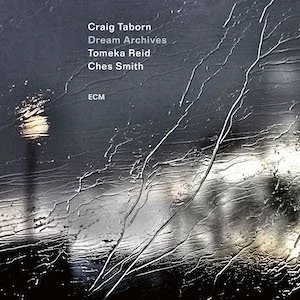Label: ECM Records, 2026
Personnel - Craig Taborn: piano, keyboard, electronics; Tomeka Reid: cello; Ches Smith: drums, vibraphone, percussion, electronics.
Pianist and composer Craig Taborn, known for his shockingly powerful technique and his ability to traverse post-modern jazz, contemporary classical music, and indie electronics, moves fluidly between structure and freedom. The six tracks on Dream Archives—four originals and two covers—are smartly conceived, finding fresh sonic angles and probing inventive approaches to rhythm. Working in a trio format with cellist Tomeka Reid and drummer/vibraphonist Ches Smith, the colorfully chameleonic Taborn adds another compelling chapter to his already rich catalogue.
“Coordinates for the Absent” oozes lyrical introspection and nocturnal delicacy, captivating through carefully traced electronics, floating vibraphone, bowed cello, and a shimmering, cinematic pianism that often falls like raindrops. “Feeding Maps to the Fire” pushes the program forward with cello and piano locked into an enthusiastic, cadenced motion that gradually dissolves into an abstract exchange of free-form gestures and shifting tonal colors. Smith’s dexterity on the kit highlights his broad rhythmic vision and adaptability, as the piece repeatedly regains momentum after a cyclical figure in five threatens to fracture the flow.
The album reaches a clear apex with Geri Allen’s “When Kabuya Dances”, whose initial three-time piano motion opens into a rubato exploration. It unfolds as a progressive Afro-jazz dance marked by tension-fraught interplay and insistent pulses, alternating between seven and twelve-beat passages. Taborn’s respect for singular compositional voices continues with Paul Motian’s “Mumbo Jumbo”. With Smith alternating between drums and vibraphone, the piece achieves a floating sensitivity with bowed, low-register cello strokes and tactical piano mobility adding extra dimension.
The title track, “Dream Archives”, emphasizes synchronicity and counterpoint, prioritizing texture and atmosphere with a sense of freedom and abandon. The trio explores spacious, electronically inflected environments, poetic cross-cutting patterns, and deliberate sequences before settling into a challenging, odd-metered vamp. “Enchant”—a soothing balm—brings the album to a serene conclusion, with Taborn and Reid sustaining a quiet tension reinforced by Smith’s refined cymbal work. Throughout, there are striking moments of beauty, embodiment, and fluid motion.
Smartly sculpted with a boundary-pushing ethos, Dream Archives showcases Taborn’s phenomenal musicality and wide-ranging sophistication. It will reward adventurous listeners and stands as one of the early highlights of contemporary jazz releases in 2026.
Favorite Tracks:
02 - Feeding Maps To the Fire ► 03 - When Kabuya Dances ► 05 - Dream Archives


















